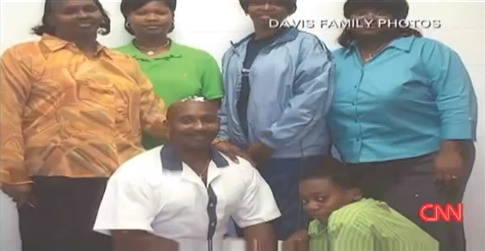On September 21, 2011, the state of Georgia executed convicted murderer Troy Davis, despite the fact that over the years–police officer Mark MacPhail was killed in 1989–multiple witnesses had recanted their testimony, saying that Georgia police had pressured them into testifying.
On March 17, Amnesty International USA, Washington Coalition to Abolish the Death Penalty, Western Washington Fellowship of Reconciliation, and Safe and Just Alternatives are uniting to present “Troy Davis: The Human Face of the Death Penalty,” held at the Keystone Church (5 p.m., 5019 Keystone Place North) in Seattle. The event is free, but donations for the Davis family will be accepted.
It’s a reminder that Washington State enforces the death penalty (by lethal injection and hanging)–as recently as September 2010 when Cal Brown, convicted of stabbing and strangling to death 21-year-old Holly Washa in 1991, was put to death. The event’s co-sponsoring organizations all argue for replacing the death penalty with life without parole
The evening is built around video footage, photos, and stories about Troy and his family, provided by Seattle documentary filmmaker and author Jen Marlowe (interviewed previously). Marlowe met over the years with Troy Davis and his family, working to prevent his execution, and will talk about Davis’s case and about the human impact that can’t be summed up in a screaming headline.
Marlowe says she wants to talk in particular about the effects the death penalty has on families, and warns that she will have footage from the vigil outside the prison in Jackson the night of Troy’s execution.
Sarah Craft, from Equal Justice USA, will pick up on Davis’s legacy, as encapsulated by his recognition in TIME Magazine’s People Who Mattered in 2011. In his final statement, he asked for his defenders to “Continue to fight this fight” against the death penalty.
“We need to remember the death penalty is not unique to Georgia,” says Craft, who will talk about efforts in Washington State to lead a legislative effort for repeal. (Like many other states, Washington has had its problems with making death sentences stick. The Seattle Times brought you the story back in 2003:
When the state wanted to execute Benjamin Harris, they said he was perfectly sane. When his conviction was overturned, they locked him up for being crazy. And recently, the state considered Harris sane enough to ask him to testify as a prosecution witness in court.
Such is the unusual tale of Benjamin Harris, the only person ever exonerated from Washington’s death row.
Oregon’s governor, John Kitzhaber, placed a moratorium on all executions in November of last year, saying the state’s capital punishment system is too broken to defend; here is Governor Gregoire’s lawyerly statement refusing to commute Cal Brown’s death sentence to life without parole.
The Senate Judiciary Committee has repeatedly made time to hear arguments for abolishing the death penalty the past three years. Publicola has more on that history, and the “surprising” lack of pushback to Sen. Ed Murray’s bill. Craft is hopeful for a House hearing next year.
Marlowe understands that people have mixed feelings about the death penalty’s application. That, she says, is what the evening is about, exploring what it means to allow the state to kill someone, and whether mixed feelings should be a call to action.

Troy Davis & The Innocent Frauds of the anti death penalty lobby
Dudley Sharp
The Troy Davis campaign, like many before it (1), is a simple, blatant fraud, easily uncovered by the most basic of fact checking (1).
The case for Davis’ guilt is overwhelming, just as were his due process protections, which may have surpassed that of all but a few death row inmates.
The 2010 federal court innocence hearing found:
” . . . Mr. Davis is not innocent: the evidence produced at the hearing on the merits of Mr. Davis’s claim of actual innocence and a complete review of the record in this case does not require the reversal of the jury’s judgment that Troy Anthony Davis murdered City of Savannah Police Officer Mark Allen MacPhail on August 19, 1989.” (2)
“Ultimately, while Mr. Davis’s new evidence casts some additional, minimal doubt on his conviction, it is largely smoke and mirrors.” (2)
“As a body, this evidence does not change the balance of proof that was presented at Mr.
Davis’s trial.”(2)
“The vast majority of the evidence at trial remains intact, and the new evidence is largely not credible or lacking in probative value.” (2)
None of this came as a surprise to anyone who actually followed the case, in contrast to the Save Troy Davis folks who were, willingly, duped.
1) a) “Troy Davis: Worldwide anti death penalty deceptions, rightly, failed”,
http://homicidesurvivors.com/2011/09/25/troy-davis-worldwide-anti-death-penalty-deceptions-rightly-failed.aspx
b) “Troy Davis fairly convicted, not ‘railroaded’ ”
http://savannahnow.com/column/2011-10-06/column-spencer-lawton-troy-davis-fairly-convicted-not-railroaded
2) “Innocence Hearing”, ordered by the US Supreme Court, US DISTRICT COURT, in the SOUTHERN DISTRICT OF GEORGIA, SAVANNAH DIV.,RE TROY ANTHONY DAVIS, CASE NO. CV409-130
http://multimedia.savannahnow.com/media/pdfs/DavisRuling082410.pdf